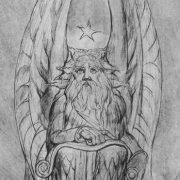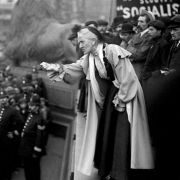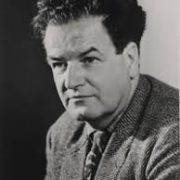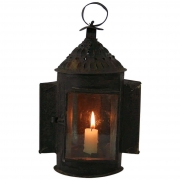MONTHLY BLOG 15, TWO HISTORIANS WHO INFLUENCED ME
If citing, please kindly acknowledge copyright © Penelope J. Corfield (2011)
Thinking of influences, two very different historians influenced me not only through their originality but through their intellectual ‘bite’. They were nothing if not challenging. In that they were very alike, although otherwise they were very different.
I tend to think of them as polar opposites: one representing the critical intellect and the other the creative intellect. In fact, however, that extreme contrast is unfair. Both men combined both qualities and both produced path-breaking historical studies. But they presented themselves to the world and to their students in different ways.
Actually I was formally taught only by one of them. He was F.J. Fisher (1908-88), universally known as Jack.1 He supervised my doctorate at the LSE. ‘Formal’ tutoring, however, was very far from Jack’s style. Often we walked round and round Lincoln’s Inn Fields (close to the LSE), sometimes for hours – talking about history and breaking off from time to time for a coffee or a drink.
Jack was a meta-critic, of great insight. He quickly moved from the immediate question in hand to the deeper implications of any intellectual position. ‘Your problem is this …’, he would commence, before peeling back layers and layers of argument. Another of his favourite ploys, used in public to deceive the unwary, was ‘I know nothing about this but …’, before posing a devastating question or deep observation. At the same time, he relished quick wit and intellectual banter. As a result, he was often surrounded by a crowd of people, laughing.
Above all, Jack Fisher was always ready to challenge any possible viewpoint. Indeed, his readiness to attack made him feared by some, including by a surprising number of senior historians. But while Jack was tough, he was also relatively kinder to beginners than he ever was to eminent scholars, when they came to lecture at LSE. In fact, he viewed it as part of his task to try to cut visiting grandees down to size, so that the students should learn to be critics rather than supine followers of ‘great men’.
Unsurprisingly, Jack rarely gave praise. But when he once said that something I’d done was ‘not bad’, I was much pleased. The result was a stimulating and enjoyable education not only in history but also in the art of thinking.
Jack Fisher was a miniaturist, writing a small number of lucid essays – not long books. That could not have been more different from the other historian who influenced me: E.P. (Edward) Thompson (1924-93). He wrote voluminously, elegantly, wordily, creatively, often amazingly. Never to other people’s deadlines, as is revealed in the most recent study of his oeuvre.2 Yet he produced books both long and short, essays and later commentaries on his own essays, historical studies, polemical tracts on current politics, theoretical interventions within the Marxist intellectual tradition(s), and countless long and informative letters, as well as poetry, and a novel.
Of course, he too was a critic. Edward Thompson was both sharp and robust in discussion and at times immensely polemical among his fellow left-wingers. Many experienced his volcanic wrath. Indeed some of his friendships were halted over political differences. His remarkable letters were also ready to rebuke, when he felt a rebuke was due, although their flowing pages might well continue with a torrent of wit and information alongside the chastisement.
It was this torrential outflow of ideas that made Edward Thompson represent for me the creative intellect, fusing ideas from sociology, anthropology, literature and history.3 I was never one of his students. Instead I met him socially, through his wife Dorothy Thompson, who was in the History Department at Birmingham University, where I was learning to teach on the job. At parties and gatherings, the Thompsons were enlivening and magnetic – and very far from didactic. But every time we met, I always got something new about which to cogitate.
In part, that was because Edward Thompson was himself in constant intellectual transition. He broke from the rigidities of the British Communist Party in 1956, after the failure of internal attempts at reform by himself and many fellow-historians including Christopher Hill. And then, slowly and agonisingly, Edward receded from strict Marxism. Instead, he strove to create his own humanist Marxism, but without falling entirely out of the Marxist embrace. Over time, however, that struggle became more difficult. He recoiled not only from the brutalities of communist regimes, perpetrated in the name of Karl Marx, but also from schematic intellectual edifices, such as the structuralist Marxism of Althusser, against whom Thompson polemicised in startling but effective style.
Overall, Edward’s utter seriousness in his commitment was compelling. He wanted to find a systematic answer – unlike Jack Fisher, who was not worried at its lack. So the travails of the left often made Edward deeply depressed. Yet his flow of wit, erudition, personal kindness and charm, plus intellectual creativity, never ceased.4
I consider myself lucky to have met both men. I don’t follow either in their views, but I do try to combine their creativity with their critical mode. The one time they both met in my presence (which was probably the one time overall that they met) was when Edward Thompson came to lecture at the LSE in the late 1960s. Crowds turned out to hear him. And they got a treat – an early version of his influential lecture, steeped in anthropology as well as history, entitled ‘The Moral Economy of the English Crowd’.5 In the discussion after the talk, Jack had the best of it. Wittily, he queried just how ‘moral’ the crowds were, when they rioted in protest at high food prices. Were they justly defending the communal welfare of the masses? Or were they, when they tried to stop grain from leaving their own areas, defending their sectional interest as one group of workers against those of other workers elsewhere? Was it ‘moral’ class solidarity? or a case of much-less-moral though readily understandable ‘I’m all right, Jack’? At the time, Edward Thompson laughed and said that he’d answer that in writing. But when he published the article, to much fame and controversy, he stuck unhesitatingly with the concept of the ‘moral’ crowd.
In a sense, they both gained. Edward Thompson succeeded in getting historians to take food riots seriously, refuting the assumption that the brutish masses reacted with knee-jerk violence whenever food prices soared. Human responses to economic crisis are far more complex, both in the eighteenth century and as we are witnessing today. But Jack was also right in that Thompson’s views would generate scholarly criticisms, from all points on the historiographical spectrum.
A final point. Neither man would fit into today’s academic world of continual assessment. Jack Fisher wrote far too little, for regular assessment purposes, though what he did write was vintage quality. Edward Thompson wrote too voluminously and eclectically, with many glittering jewels amidst much vivid polemics, without meeting deadlines – being an old-style ‘man of letters’ and not a career Prof. But so much the worse for today’s world of academic assessment. They were great historians, who don’t fit into any mould.
1 For further details and a collection of Jack Fisher’s path-breaking essays, see P.J. Corfield, ‘F.J. Fisher and the Dialectic of Economic History’, in P.J. Corfield and N.B. Harte (eds), F.J. Fisher: London the English Economy, 1500-1700 (1990), pp. 3-22.
2 See Scott Hamilton, The Crisis of Theory: E.P. Thompson, The New Left, and Postwar British Politics (Manchester, 2011), reviewed by P.J.C. in electronic Reviews in History: IHR London – featured review no 1137 (29 Sept. 2011): see website www.history.ac.uk/reviews/review/1137. Another helpful overview is provided Bryan D. Palmer, Objections and Oppositions: The Histories and Politics of E.P. Thompson (1994).
3 For further details, see P.J. Corfield, ‘E.P.Thompson, Historian: An Appreciation’, New Left Review, 201 (1993), pp. 10-17.
4 For a quick introduction, see Dorothy Thompson (ed.), The Essential E.P. Thompson (New York, 2001).
5 E.P. Thompson, ‘The Moral Economy of the English Crowd in the Eighteenth Century’, Past & Present, 50 (1971), pp. 76-136; repr. in his Customs in Common (1991), pp. 185-258, with his response to the debates in ‘The Moral Economy Reviewed’, ibid., pp. 259-351.
For further discussion, see Twitter
To read other discussion-points, please click here
To download Monthly Blog 15 please click here








